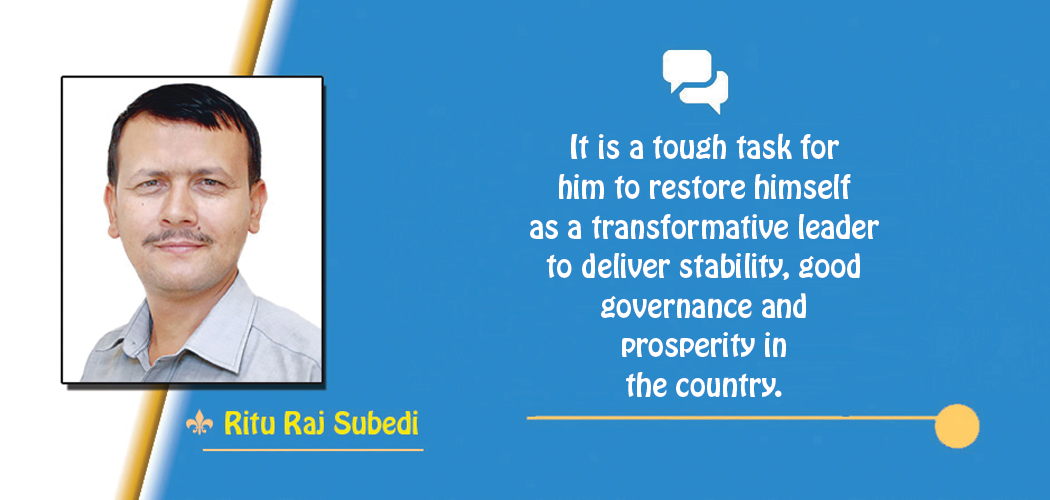- Thursday, 26 February 2026
Prachanda’s Third Innings Treading A Tightrope
CPN-Maoist Centre chairman Pushpa Kamal Dahal Prachanda has kicked off his third innings as Nepal’s Prime Minster with the backing of newly formed 7-party coalition. He was appointed a new PM in a dramatic twist of the political events marked by dissolution of an old alliance and creation of the new one that is a medley of incompatible ideologies. By becoming the new head of government, Prachanda is poised to burnish his old image as a revolutionary leader to check the fast erosion of his party’s influence and support base as seen in the recent federal and provincial elections.
The Maoist Centre came out as the third and decisive political force despite losing many seats in the elections. The emerging political dynamisms catapulted him to the seat of highest executive but it is a tough task for him to restore himself as a transformative leader to deliver stability, good governance and prosperity in the country. He must tread a tightrope while balancing and coordinating with the coalition partners on the one hand and dealing with external geopolitical forces on the other.
Collapse of alliance
The breakdown of five-party alliance, led by Nepali Congress and former prime minister Sher Bahadur Deuba, was quite unexpected, thanks to his own rigid stance on premiership. As media reported, Deuba and Prachanda had agreed to lead the new government on a rotation basis, with Prachanda heading its first half tenure of five-year premiership. As per the deal, NC would get the post of President and the Maoist Centre the Speaker. However, Deuba weaselled out of this gentleman deal, citing that his party leaders were not ready to hand over the premiership to Prachanda first.
Feeling betrayed by the NC, Prachanda rushed to CPN-UML chair KP Sharma Oli, who had earlier pledged him the premiership. Oli was in touch with second-rung leaders of Maoist Centre over the formation of a new alliance in case NC-led alliance fell apart. However, sudden bonhomie between Prachanda and Oli is equally bewildering, given that the former was on the forefront against the latter’s move to dissolve the parliament twice, terming it a regressive move. NC has become the biggest loser in this political game despite being the largest party in the parliament. In addition to the post of President, it is set to lose the position of Chief Ministers in many provinces and key posts in the vital constitutional bodies. Deuba’s critics have roasted him for failing to keep the five-party alliance intact.
Unlike many NC leaders, Deuba has not blamed Prachanda for the collapse of the alliance he led. Instead, he himself has admitted mistake for not letting Prachanda to lead the new government first, according to some media reports. Stung by its failure to lead the new government, the NC is determined to upset Prachanda’s apple cart. The other day its spokesman has claimed that the new coalition government would not last long. However, the NC does not pose a big challenge to the new government if its constituents stick together and work as per the common minimum programme, which it is going to unveil soon.
PM Prachanda is to give a full shape to his 8-member Cabinet after taking vote of confidence scheduled for Tuesday (Jan 10). Nonetheless, for Prachanda it is a hard nut to crack to run the coalition government that consists of parties of diametrically opposite ideologies. Rajendra Lingden-led Rastriya Prajatantra Party, which has backed to form the government but not participated in it, wants to upend federalism, secularism and republican set-up. Prachanda had led a decade-long insurgency to establish these three political systems in the country. Now Lingden has demanded that the government announce public holiday on the birthday of Prithvi Narayan Shah, the unifier of Nepal, as a precondition to join the government. No doubt, this is a genuine demand but it must not be used as a political stunt to fulfil the parochial interest of the very party.
In a similar manner, Rastriya Swatantra Party, headed by Rabi Lamichhane, who is Deputy Prime Minister and Minister for Home Affairs, has stood against federalism. It did not field candidates in the provincial polls as a sign of protest. DPM Lamichhane has been dragged into a citizenship case. There may arise conflict of interests for the police is investigating into it. PM Prachanda is also under pressure to meet the demands of Janata Samajabadi Party (JSP) of Upendra Yadav, Janamat Party of CK Raut and Nagarik Unmukti Party of Resham Chaudhari.
Lion’s share
Moreover, the UML with 78 seats holds the key of the government and is firm to take a lion’s share of posts, including the President, Speaker and Chief Ministers at least in four provinces. PM Prachanda should take the UML into confidence before making any major decision. The coalition has already formed two committees – a high level mechanism under Oli and a committee assigned to prepare the common minimum programme led by DPM and Minister for Finance Bishnu Paudel. The high-level mechanism will exercise its influence to shape the agenda and action of the government.
In the past, Prachanda had led two governments, each lasting for nine months. He has lamented that he could not live up to public expectations owing to lack of time and experiences while leading the government. Now Prachanda has got the opportunity to lead the government at least for two years if the ruling coalition does not break up during this period. The onus is on Prachanda to deliver result-oriented outcomes so as to provide relief to the people hit hard by soaring inflation, unemployment and poverty. The Maoist supremo has perhaps the last chance to boost the image of the party that has taken a hit with its continuous hobnobbing with power since joining the peace process in 2006.
(The author is Deputy Executive Editor of this daily.)

















